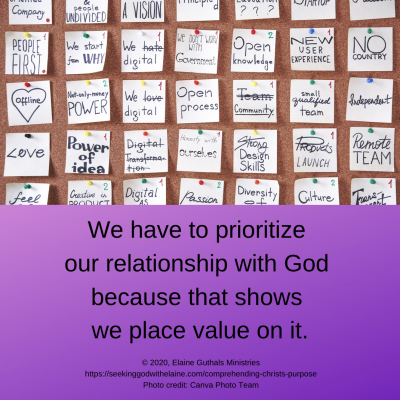Jesus came to earth for one purpose – to fulfill the plan of salvation. We need to accept that gift and grow our relationships with Him. This daily devotional looks at placing value on Jesus’ sacrifice and how we can depend on God.
Nuggets
- Jesus’ sacrifice on our behalf is the foundation on which we, as disciples of Christ, build.
- We have to prioritize our relationship with God because that shows we place value on it.
- We can depend on God because He is unchangeable.
Devotions in the Comprehending Christ’s Love series

This is the third — and last — part in the Comprehending Christ’s Love series. I know you are expecting this. I have to split this into two devotions, also.
Well, I wouldn’t want it to get a complex since I had to split both of the other two parts.
We have been looking at a sermon by Baker entitled Comprehending Christ’s Love. We’ve talked about the dimension of Christ’s love and why we need to comprehend it. Now, we are going to be looking at the purpose.
Resource
Let's Put It into Context
“And may you have the power to understand, as all God’s people should, how wide, how long, how high, and how deep his love is” (Eph. 3: 18 NLT)
Here is what we pulled out of the devotions so far.
- God’s everlasting love means that — no matter what we do — He is going to love us.
- God loves us so much that He designed a plan to restore our relationship with Him.
- The purpose God has in saving us is so that we are no longer spiritually dead.
- Jesus’ love for us is so intense that He willingly gave up His life — gave up Heaven — so His blood could be used as the sacrifice for us.
- The plan of salvation is open to all mankind.
- Even as His love for us is going to last forever, God is going to have an agreement with us that will last forever.
- Because we are children of God, we are heirs of God.
- We are not called to be children of God by anything we do; it is about what Jesus has already done for us.
- We may not be able to figure out everything about God, but we have to figure out enough to believe in Him.
- What God won’t forgive is our continued unbelief.
- Jesus has a personal love for us.
- Love is the foundation on which Jesus and God built the plan of salvation.
Note: The headings in purple and blue are Baker’s words, not mine.
For What Purpose He Expresses This Desire
I am a firm believer that everything happens for a purpose. Scriptures tell us that. “There is a time for everything, and a season for every activity under the heavens” (Ecc. 3: 1 NIV).
We can look at that in a couple of ways. We can say that God has everything scheduled on the calendar. I can see this.
But we can also say that one experience leads to another. I think that is also something God does.
We know God wants us to grow in grace and knowledge (II Pet. 3: 18). We use building blocks to grow. To me, that means there needs to be a foundation in which this growth occurs.
Jesus’ sacrifice on our behalf is the foundation on which we, as disciples of Christ, build. It has to start there.
If we don’t ABCD, we are still spiritually dead. Spiritual death is the separation from God that occurred as a consequence of Adam and Eve’s original sin.
Once we are spiritually alive, we can begin to grow. The spiritually alive are those who have ABCDed, so they are no longer separated from God.
Let’s check out what Baker had to say about that growth.
That they might be able rightly to value it
“More than that, I also consider everything to be a loss in view of the surpassing value of knowing Christ Jesus my Lord. Because of him I have suffered the loss of all things and consider them as dung, so that I may gain Christ and be found in him, not having a righteousness of my own from the law, but one that is through faith in Christ — the righteousness from God based on faith” (Phil. 3: 8-9 CSB)
In order to grow our relationship with Jesus, we have to put value on Him. We do that by valuing His sacrifice. When we do, we are adopted by God into His family.
When is knowledge not just knowledge? In the Scriptures. The knowledge is supposed to lead to growth.
Hodge helped us understand how we are supposed to approach knowledge. He wrote, “In the Scriptures knowledge is not mere intellectual apprehension; it includes the proper apprehension not only of the object, but of its qualities; and if those qualities be aesthetic or moral, it includes the due apprehension of them, and the state of feelings which answers to them.”
Resource
That is just another way to say we need heart knowledge, not head knowledge — but with a twist. We have been saying heart knowledge is believing, not just knowing.
What Hodge is saying here is that we can’t just do a surface know. Instead, we have to get down to the root.
• Yes, we have to know that Jesus was a Man. But we also have to know that He is God and He came to show us Who God is.
• Yes, we have to know that Jesus went around healing the sick and feeding the poor. But we also have to know that His primary purpose was to pay the penalty for our sins so that we may restored our relationships with God.
• Yes, Jesus wanted us to choose the narrow gate. But we have to know that means justification, adoption, and sanctification.
Resource
Glossary
We have to not only know that Jesus was expecting us to change our character for this life, He was expecting us to prepare for eternal life. That is the sole purpose of the plan of salvation.
Once we get that knowledge, we begin to value Jesus and what He did. If we value something, we will take care of it. We have to take care of our relationship with God.
Let’s see what hints we can get from Paul here. We may get tripped on on his wording. “… I also consider everything to be a loss” (Phil. 3: 8-9). We hate being deprived of something.
I don’t think this is what Paul was really getting at. I don’t think Paul ever felt he had been deprived.
For Paul, the focus was never on what he gave up or lost. It was always on what he gained.
Oh, yeah. Paul said he considered it gone but look what he said later. “… I have suffered the loss of all things and consider them as dung …” (Phil. 3: 8 CSB).
Well, the King James Version also translates the word as dung. All of the other newer versions translate it as garbage or rubbish.
We get the idea — worthless.
I think Paul was saying everything else was a lower priority. We have to prioritize our relationship with God because that shows we place value on it. Everything else is less important.

Paul knew what he would gain. Manton gave us a list.
- We will no longer be subject to the wrath of God.
- We once again will have access to God as we are adopted by God into His family.
- We will be regenerated.
- We will receive wisdom, righteousness, sanctification, and redemption. (I Cor. 1: 30).
- We receive eternal life because we are children and heirs of God.
Resource
Glossary
That they might depend upon it
“Every good and perfect gift is from above, coming down from the Father of lights, who does not change like shifting shadows” (Jas. 1: 17 CSB).
We can depend on God because He is unchangeable. When we use our gifts for Him, He rewards us even more.
Jortin made an interesting observation. He wrote, “All the promises and threatenings contained in the New Testament are conditional, and the condition is plainly expressed.”
Resource
We may think God has changed His mind because we don’t see the promises falling as we think they should. What we gloss over is that fulfillment of the promises is based on our choices and our actions.
The covenant agreement is between two parties — God and us. We have to keep up our end of the agreement.
Glossary
God has a purpose for everything. He has plans to accomplish those purposes.
Those plans are good for us. “‘For I know the plans I have for you,’ declares the LORD, ‘plans to prosper you and not to harm you, plans to give you hope and a future’” (Jer. 29: 11 NIV).
I think we see plans as more of a goal or a checklist. We see it as actions to check off because God has me down for the job of [fill in the blank].
I think, many times, those plans come in the form of gifts. I like how Vaughan described gifts. He wrote, “A gift is something that expresses the mind and [indicates] the love of the giver, and at the same time brings happiness to the receiver.”
Resource
Oh, yes. The gifts are all about His love.
We think of the “every good and perfect gift …” (Jas. 1: 17 CSB) as being the ones to “… prosper …” (Jer. 29: 11 NIV) us. We see it as the gift that will make this life more comfortable.
God gives us the gift of being able to write (so we can create a blog to get His Word out). God gives us the gift of encouragement (so we can support fellow disciples when they are going through trials).
The focus isn’t on the gift. It is on the Giver.
The focus isn’t on the gift. It is on what we do with the gift to expand the Giver’s kingdom.
The gifts are what God gives us so that we can become perfect.
We know perfect has a different definition than it being exactly the right color, size, usefulness, etc. The perfected state indicates spiritual wholeness or completeness.
God will provide for us in this life. His priority, though, is eternal life.
We know we won’t be perfect until we get called home to God. That is where the best gifts are going to be.
Macmillan made an excellent point that I hadn’t really thought of before. Sunshine, light, heat, wind, air, dew, and rain all come from above. They don’t originate from the earth.
Resource
God is the one Who provides for us. Macmillan wrote, “The things that come from above sweeten and ennoble life, reconcile and unite men to one another, and make one family, one loving brotherhood of the human race.”
Resource
The things from above unite us. The worldview will never unite us because it is from Satan. Satan is all about chaos and division.
Unity may be one of the buzz words for 2020, but we have to be very careful. We know the world will be United one day — under the Antichrist.
Then will come judgment.
But also, all of God’s plans will come to fruition. We will no longer be separated in any way from Him.
That is what the plans are about. That is what all the gifts are leading to — our reunion with Him.

Making the Connections
God isn’t looking to be an acquaintance. He wants the key to the front door. He wants complete access.
But God doesn’t want to just be a roommate. He wants priority.
This isn’t a one-way street. Our making God a priority will net us wonderful gifts.
How Do We Apply This?
It comes down to what it will always come down to. We have to ABCD and grow in knowledge and grace. How do we do that?
The ABCDs of Salvation
If you have not become a believer in Christ, please read through the
Plan of Salvation and prayerfully consider what God is asking you to do.
A – admit our sins
B – believe His Son Jesus is our Redeemer
C – confess God as Sovereign Lord
D – demonstrate that commitment by making any changes needed in our lives to
live the way in which God has called us
The Disciple’s Job Description
Searching for and Seeking God
Hearing His Word (Rom. 10: 17).
Reading His Word (Rev. 1: 3).
Praying to Him (Heb. 4: 16).
Studying His Word (Ac. 17: 11).
Meditating on His Word (Ps. 1: 1-2).
Memorizing His Word (Ps. 119: 11).
Gracious, loving Heavenly Father. We make You a priority in our lives. Starting right now, we commit to know You even better. We don’t want a surface love for You. We want a deep, abiding love for You. Please reveal Yourself to us. Amen.
What do you think?
Leave me a comment below (about this or anything else) or head over to my Facebook group for some interactive discussion.
If you don’t understand something and would like further clarification, please contact me.
If you have not signed up for the email daily or weekly providing the link to the devotions and the newsletter, do so below.
If God has used this devotion to speak with you, consider sharing it on social media.
Pingback: What Is Peace? – Seeking God with Elaine